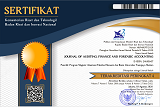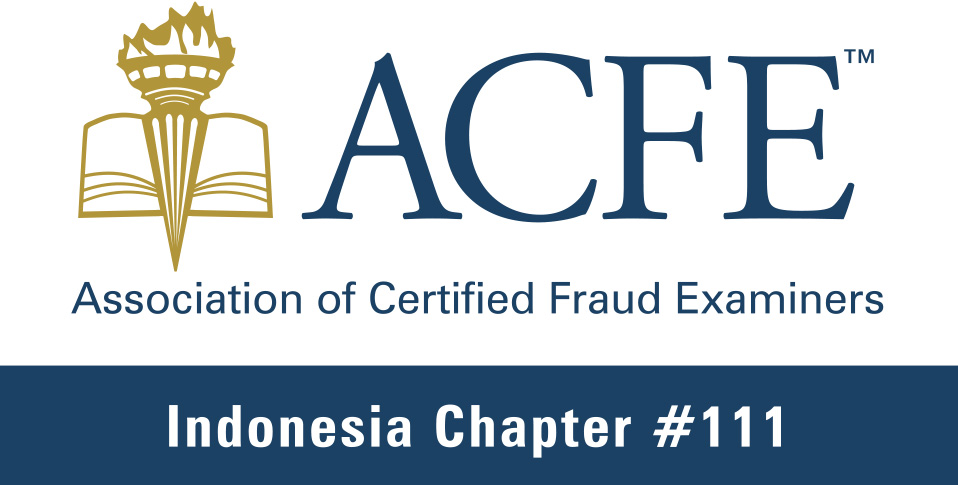Academic Fraud Behavior of Accounting Students in Dimensions of Fraud Hexagon Theory
Abstract
The purpose of this research is to show the fraud hexagon theory perspective on the occurrence of academic fraud for accounting students. The independent variable in this research is pressure, opportunities, rationalization, capability, arrogance and collusion while the dependent variable is academic fraud. This research uses primary data obtained from online questionnaires. The sample of this research uses accounting students who are registered at the University of Hayam Wuruk Perbanas. This research used multiple linear regression. The results of this study indicate that opportunities, capability and collusion have a positive effect, while the pressure, rationalization and arrogance have no effect on the occurrence of academic fraud
Keywords
Full Text:
PDFReferences
ACFE Indonesia Chapter. (2019). Survei Fraud Indonesia 2019.
Apsari, A. K., & Suhartini, D. (2021). Religiosity as Moderating of Accounting Student Academic Fraud with a Hexagon Theory Approach. Profesionalmudacendekia.Com, 1(3), 211–230. https://doi.org/10.47153/afs13.1512021
Arjuni, E., Diana, N., & Mawardi, M. C. (2022). Pengaruh Teori Fraud Pentagon dan Efikasi Diri Terhadap Kecurangan Akademik Mahasiswa Pada Pembelajaran Daring (Studi Kasus Pada Mahasiswa Akuntansi Di Kota Malang). Jurnal Ilmiah Riset Akuntansi, 11(04), 62–76. http://www.riset.unisma.ac.id/index.php/jra/article/view/15300
Christiana, A., & Kristiani, A. (2021). Kecurangan Pembelajaran Daring Pada Awal Pandemicovid-19:Dimensi Fraud Pentagon. Jurnal Pendidikan Akuntansi Indonesia, 19(1), 66–83.
Creswell, J. W. (2016). Research Design Pendekatan Kualitatif, Kuantitatif, dan Mixed. Yogyakarta: Pustaka Pelajar
Crowe Howarth. 2011. “The Mind Behind The Fraudsters Crime: Key Behavioral and Environmental Elements.” Crowe Horwath LLP 1–62.
Fadersair, Kennedy, and Subagyo Subagyo. 2019. “Perilaku Kecurangan Akademik Mahasiswa Akuntansi : Dimensi Fraud Pentagon (Studi Kasus Pada Mahasiswa Prodi Akuntansi Ukrida).” Jurnal Akuntansi Bisnis 12(2):122–47. doi: 10.30813/jab.v12i2.1786
Fadilah, N., Rahmawati, & Parta, I. K. (2020). Pengaruh Religiusitas dan Rasionalisasi terhadap Pendeteksian Kecurangan pada PT. PLN (Persero) ULP Kota Palopo. Rama Repository.
Oktarina, D. (2021). Analisis Perspektif Fraud Pentagon pada Terjadinya Kecurangan Akademik Mahasiswa Akuntansi. EKONIKA Jurnal Ekonomi Universitas Kadiri, 6(2), 227. https://doi.org/10.30737/ekonika.v6i2.1450
Sugiyono. (2011). Metode Penelitian Kuantitatif Kualitatif dan R&D. Bandung: Alfabeta.
Suryandari, E., & Valentin, L. (2021). Determinan Fraud Dana Desa : Pengujian Elemen Fraud Hexagon, Machiavellian dan Love of Money. Reviu Akuntansi Dan Bisnis Indonesia, 5(1), 55–78. https://doi.org/10.18196/rabin.v5i1.11688
Vousinas, Georgios L. 2019. “Advancing Theory of Fraud: The S.C.O.R.E. Model.” Journal of Financial Crime 26(1):372–81. doi: 10.1108/JFC-12-2017-0128.
Wolfe, David T., and Dana R. Hermanson. 2004. The Fraud Diamond: Considering the Four Elements of Fraud: Certified Public Accountant, The CPA Journal, 74(12), Pp. 38–42.
DOI: https://doi.org/10.21107/jaffa.v11i1.18432
Refbacks
- There are currently no refbacks.
Our Journal indexed by:
Our support tools using:



This work is licensed under a Creative Commons Attribution 4.0 International License.












